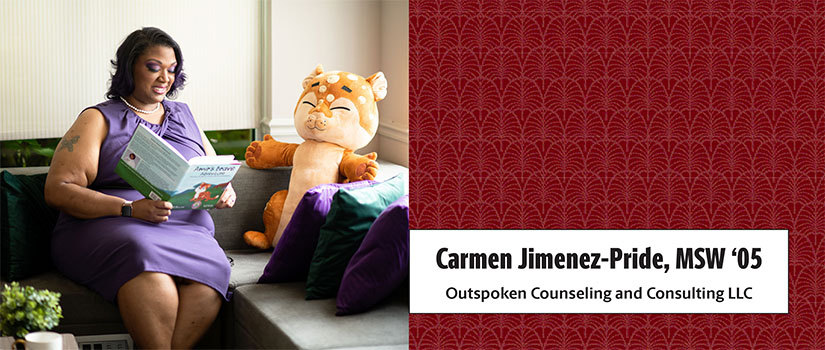Nov. 18, 2020
Chris Woodley • cwoodley@mailbox.sc.edu
According to the Centers for Disease Control and Prevention, approximately 4.4 million children aged 3 to 17 have diagnosed anxiety and 1.9 million in the same age group have diagnosed depression. Children’s mental health issues may affect their learning, behavior and emotions. But alum Carmen Jimenez-Pride, a licensed clinical social worker and therapist, is using play therapy to help improve children’s mental health.
Play therapy helps children express their issues and problems when they do not have the words to adequately express their feelings and emotions. The model respects children’s unique development level by utilizing play, which is often referred to as the language of the child. In addition to other services at her practice, Outspoken Counseling and Consulting LLC in Augusta, Georgia, Jimenez-Pride has used play therapy for more than 10 years.
“I love working with kids using their language,” Jimenez-Pride says. “Adults are constantly putting words in kids mouths and creating a language for them. But play therapy is their natural language and most of the parents and children react favorably.”
Jimenez-Pride initially had no interest in direct practice while attending the College of Social Work. But after earning her Master of Social Work degree in 2005, her first job in child welfare opened her eyes to the possibility of providing one-on-one therapy.
“I saw the lack of services and how my colleagues were often overwhelmed with the referrals for available services,” Jimenez-Pride says. “Making connections within the community and meeting people working with kids led me towards the clinical route by being on the other side of child welfare.”
Jimenez-Pride says the most satisfying part of play therapy is when children are excited for sessions to start and do not want to leave. This remains true today, even though COVID-19 has limited her in-person play therapy sessions by 50 percent.
“Most of the children I work with are having fun and not realizing they are learning and growing at the same time,” Jimenez-Pride says. “I hate to tell them sometimes that I can't see them because I'm in training. They hate missing play therapy, but I always come back with fun stuff for them.”
Sand tray therapy is one type of play therapy incorporated by Jimenez-Pride. She uses a sand tray with different textures that has kinetic properties of touch and feel and is intended to connect thinking and creativity.
“Children can create their story in the sand tray without words by using different miniatures,” Jimenez-Pride says. “The sand tray has healing properties that are relaxing and connected to play therapy.”
Jimenez-Pride also created Play Therapy with Carmen Inc. in 2017 to provide training and resources for professionals to increase their play therapy skills. Focus on Feelings is one of the resources she created for doctor’s offices, schools, parents, and others who work with children. It includes products and curriculum to assist children with their learning and understanding of feelings, increased communications skills, and improving social and emotional development.
“I developed Focus on Feelings because I couldn’t find anything that was multi-cultural to use within my practice to help teach kids about feelings,” Jimenez-Pride says. “I found that only 10 types of feelings were mostly coming from my kids in the playroom. If you can teach these 10 feelings, it opens the door to other feelings and starts the communication between a child and adult. Parents can read books to their children and clinicians have a multi-cultural resource that is easy to incorporate.”
To compliment her training and resources, Jimenez-Pride has also published three children’s books and uses them as part of her play therapy. She wrote her first book, “No, No, Elizabeth,” several years before it was published in 2017. She has since published two more books, “Elizabeth Makes a Friend,” and “Amir’s Brave Adventure: Exploring Confidence, Mindfulness and Attachment.”
“I was always terrified to put anything out but wanted to start doing more creative stuff, so I contacted a publisher who read ‘No, No, Elizabeth.’” Jimenez-Pride says. “She liked the concept of the book and my approach of being a play therapist and social worker.”
In “No, No, Elizabeth,” the title character wants to play and attempts to engage her family. But they are all busy and keep telling her, "no." Elizabeth’s feelings are hurt, and she thinks that no one loves her. She internalizes her feelings before her family tells her that saying “no” does not mean they do not love her less.
“This book is just as much for adults as it is for kids,” Jimenez-Pride says. “It tells adults that just because something is not working in the moment, it does not mean it's on you and you need to keep going. While I want therapists to use my books for play therapy, I want anyone to use them and hope it has as much of an effect on them as it does for me in my work setting.”
Jimenez-Pride also enjoys providing play therapy workshops for social workers. Her trainings give participants the opportunity to practice and experience, with the goal of teaching creative methods to help children transition from hurt to healed.
“It’s enjoyable to see clinicians laughing and having fun during my trainings,” Jimenez-Pride says. “That's when I know they will go back and hopefully have the same experiences in their offices.”
While Jimenez-Pride plans to expand on her Focus on Feelings brand and has begun incorporating yoga into her play therapy, she is excited to mentor the next generation of social workers who will help children express their feelings and emotions without words.
“I also plan to do more teaching, supervising and consulting to give back to the social work community, Jimenez-Pride says. “I love working with new grads to help them become licensed, transition into private practice and become play therapists.”
